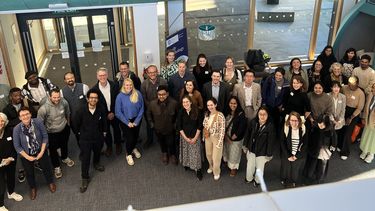This event, which received funding from IGSD, the Development Studies Association (DSA), the European Association of Development Research and Training Institutes (EADI), and the University of Manchester, provided a unique opportunity to share insights on urban informality and establish an international network that can facilitate further research and collaboration on urban informality.
The event featured keynote addresses by Professors Diana Mitlin from the University of Manchester and Alison Brown from Cardiff University. They delved into the historical trajectories and emerging directions in urban informality research, providing valuable insights into the field's evolution.
Following the keynotes, IGSD members Melanie Lombard and Philipp Horn launched their book “Urban Informality: An Introduction” (Bristol University Press). They discussed the book's content, writing process, and unique approach. Melanie emphasised the incorporation of diverse voices, aiming to provide both global and historical perspectives on practices and processes labelled as informal. Philipp highlighted their goal to create an accessible yet nuanced exploration of informality, addressing the gap between overly complex academic works and overly simplified educational materials. The book stands out for its multi-modal and multi-voice representation, including testimonies from interviews, fiction, films, poetry, videos, policymaker insights, and contributions from various organisations. It is relevant to both the global South and the global North.
Additionally, Nikhilesh Sinha and Colin Marx shared insights from their edited volume, “Urban Informality and the Built Environment: Infrastructure, Exchange and Image” (UCL Press). Colin recounted the book's eight-year journey, originating from an initiative within UCL's built environment faculty to connect PhD scholars working on urban informality with more senior writing mentors. The book seeks to shift the focus from a state-centric understanding of informality to one that foregrounds the built environment and other relational dynamics. Nikhilesh pointed out their intention to provide a platform for new voices, particularly highlighting the rich empirical work found in PhD research. The book presents diverse case studies from multiple geographies, underscoring the importance of studying urban informality in the global North and South.
The event successfully brought together scholars from different universities, contributing to the ongoing discourse on urban informality and setting the stage for future collaborations.

